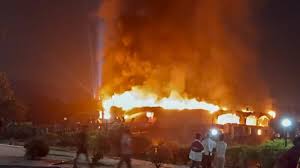Dallas, TX — The sudden death of Chris Carpenter, a local resident whose life was cut short by a suspected fentanyl overdose at Hendy’s on Henderson Avenue, has sent shockwaves through the community. The incident, now under investigation, underscores the deadly grip of the synthetic opioid crisis in North Texas—a crisis that claims thousands of lives annually.
A Life Remembered
While details about Carpenter’s personal life remain sparse, social media tributes describe him as a beloved figure among friends, remembered for his warmth and humor. His passing has reignited conversations about the invisible threat of fentanyl, often hidden in counterfeit pills or mixed with other substances.
“This isn’t just a statistic—it’s someone’s child, friend, or neighbor,” said Marisa Lopez, a Dallas-based addiction counselor. “Fentanyl doesn’t discriminate. One pill can kill.”
 The Venue and the Broader Context
The Venue and the Broader Context
Hendy’s, a popular bar and restaurant on Henderson Avenue, is now at the center of a grim narrative. While there’s no indication the establishment is linked to the overdose, the location’s visibility has amplified calls for broader access to naloxone (Narcan), a life-saving overdose reversal drug. In 2022, Dallas County reported over 500 fentanyl-related deaths—a 250% increase from 2019, per the county medical examiner.
Local businesses, including some near Henderson Avenue, have begun stocking Narcan. “We train staff to recognize overdoses,” said Jeff Reynolds, owner of a nearby music venue. “But this crisis needs more than reactive measures.”
A Statewide Emergency
Texas has seen fentanyl-related fatalities soar, mirroring national trends. The DEA’s Dallas field office notes that 40% of counterfeit pills tested contain lethal doses of fentanyl. Legislators recently passed House Bill 6, mandating fentanyl poisoning be classified as a felony, but critics argue enforcement alone won’t suffice.
“We need harm reduction and education,” said Dr. Sarah Kim, a UT Southwestern toxicologist. “Many users don’t know they’re taking fentanyl until it’s too late.”
Community Reactions
On social media, Carpenter’s death has spurred both grief and frustration. “How many more funerals before we act?” tweeted one Dallas resident. Others shared resources for addiction support, like the North Texas Harm Reduction Alliance.
Moving Forward
As Dallas mourns, Carpenter’s story becomes a rallying cry. Families impacted by overdoses are pushing for wider Narcan distribution and honest drug education in schools. For now, the city grapples with a painful truth: behind every overdose is a name, a story, and a community left to pick up the pieces.
Resources:
– National Helpline: 1-800-662-HELP
– Dallas County Harm Reduction: www.dallascountyharmreduction.org






